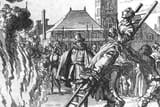>>17965680 (OP)
Many people probably don't realise how ununified the protestant cause was in the HRE. There were broadly speaking two teams: the Lutherans (and later on Calvinists) and the Reformed (Ana-/baptists, earlier on the Calvinists). In the Confessio Augustana of 1530 "lutherans", lead by Melanchthon, tried to ingratiate themselves with the imperial authority in order to gain legitimacy. Simultaneously they distanced themselves from the more radical reformed protestants. With the Peace of Augsburg in 1555 only recognized the lutherans (later the calvinists as well) and thus protected them from persecution. And this protection wasn't expanded towards the reformed protestants.
>whatever happened there.
In the 1520s the patricians, craftsmen's guilds and catholic catholic clergy vied for influence over the city of Münster, which was the seat of the Bishop of Münster who in turn was a prince-bishop. The guilds converted to baptism and Bernd Rothmann, a famous anabaptist preacher, often frequented the city. Despite being forbidden from entering the city and preaching therein, many of the bourgeois of Münster were friendly towards the anabaptists and covered him. By the early 1530s the anabaptists were in most ruling positions of the city and entrenchend themselves, exploiting the fact that the position of the bishop changed three times in a short series of time. The third bishop, Franz von Waldeck (himself being sympathetic to the protestant cause and later trying to transform his prince-bishopship into a secular, thus hereditary protestant state) acted against the Münster Anabaptists by prohibiting trade with the city and confiscating their livestock. In turn they took hostages and Waldeck was forced to a compromise: the anabaptists were allowed to stay in the city but all churches therein were to remain catholic.
1/2
Pic rel: the siege of Münster depicted by Erhard Schön
>>17966712
See above. Lutherans and Anabaptists didn't mix well.

